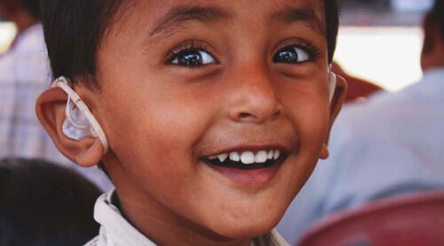Blog by Ms Brinda Crishna, Founder VAANI Deaf Children’s Foundation
The core of all the work we do at VAANI is the need to address issues of the total development of the deaf child, focusing on their social and emotional needs and those of their families, and the role of communication to address these issues.
Social and emotional needs of deaf children
When we think about a child, we have to think about the whole child. Emotional, cognitive, social and physical developments are interrelated and influence each other. However, in my over three decades of experience in working with children with disabilities, I have seen that most often, once a child is diagnosed with a disability, the whole child is often forgotten and the disability becomes the identity of the child, so a child is deaf, or has cerebral palsy or learning disabilities and so on. Rehabilitation programmes for deaf children focus on reading and writing and learning to speak and most often the development of the other facets of growth, especially emotional and social growth, get neglected.
All children need love, acceptance, appreciation, a sense of belonging and feeling of security to grow up as self-confident individuals. Control over their environment, becoming self-reliant and independent is important as a child grows. All children want to feel they belong in their environment, be this within their family, their school, and their neighbourhoods. The need to make friends and develop meaningful relationships, to share ideas, to contribute, basically to be able to communicate is an integral part of child’s life. Deaf children are no different and have the same needs.
In reality, however, the inability to hear leads to inadequate language development, gaps in comprehending the world around, and above all a sense of complete isolation for deaf children, as they are unable to express and communicate their needs. Hence there should be an urgency to address the issues of social and emotional well-being of deaf children, along with their need to learn to read and write. Therefore, the role of the family in supporting their children to understand and cope with deafness is of paramount importance.
Social and emotional needs of parents
The birth of a child is an occasion for joy and celebration. There is anticipated excitement. However, when parents learn that their child is not perfect, has a disability, the shock is unparalleled. Research has shown that the shock is often as great as having given birth to a stillborn child. In the Indian social structure, most often the mother is blamed for the disability and often leading her to be rejected. Hence there is a huge need to provide the parents with support to understand their emotional trauma and come to terms with it. It is only after they have begun to heal, from what often is thought of as a tragedy that they will be able to contribute and support the development of their own deaf child.
The VAANI model of Service Provision
At VAANI we consciously work towards understanding and providing support to this emotional and social need for parents and their deaf children. We believe that all work has to be done in partnership with parents and primary caregivers. The reason being that although the professional comes with technical knowledge and skills, it is the parents, especially the mother who knows her child best.
In order to develop this partnership where both groups make positive contributions and learn from each other, training is provided. Training is not only restricted to skill development so that the parents are able to work with their young deaf child with the challenges faced with hearing, communication and literacy. Programmes are also designed to instil in parents the ability and the confidence to accept their child’s “differences”, help and guide their child through her formative school years towards becoming a confident independent adult and groom themselves as agents of change by influencing policy-making authorities and the Government.
Training is provided to professionals, not only to develop their technical skills in working with deaf children but also to understand the social and emotional needs of families and their deaf children. These trainings include topics like understanding grief and trauma, how to listen to parents and provide basic counselling, developing parent support groups, how deaf children can communicate, express emotions and deal with difficult situations etc.
A change in one’s attitude, of being able to look at abilities, and not disabilities, to look at strengths and not weaknesses, appreciate difference as a unique facet of an individual is possibly the greatest lesson we can learn as professionals in the deaf sector.



